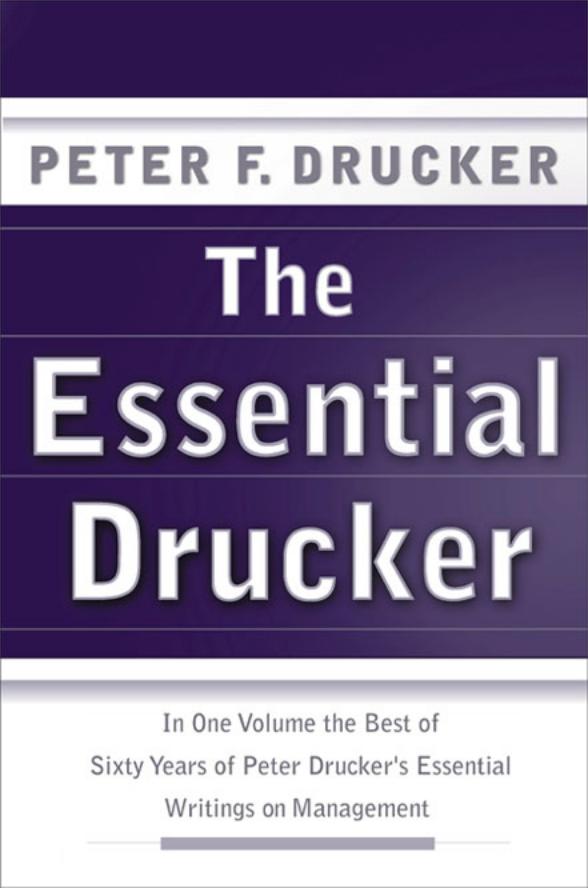
drucker-peter-f1-the-essential-drucker
.pdf

A N E X C E R P T F R O M
T H E E S S E N T I A L
D R U C K E R
Selections from the Management Works of
P E T E R F . D R U C K E R

THE ESSENTIAL DRUCKER. Copyright © 2001 Peter F. Drucker. All rights reserved under international and Pan-American Copyright Conventions. By payment of the required fees, you have been granted the non-exclusive, non-transferable license to access and read the text of this e-book on screen. No part of this text may be reproduced, transmitted, down-loaded, decompiled, reverse engineered, or stored in or introduced into any information storage and retrieval system, in any form or by any means, whether electronic or mechanical, now known or hereinafter invented, without the express written permission of PerfectBound™.
PerfectBound ™and the PerfectBound™ logo are trademarks of HarperCollins Publishers
Print edition first published in 2001 by HarperCollins Publishers, Inc.

C O N T E N T S
Introduction: The Origin and Purpose of
The Essential Drucker
I . M A N A G E M E N T
01. Management as Social Function and Liberal Art
0
I I . T H E I N D I V I D U A L
13.Effectiveness Must Be Learned
I I I . S O C I E T Y
23.A Century of Social Transformation—Emergence of Knowledge Society
About the Author Credits
About PerfectBound e-Books


I N T R O D U C T I O N :
T H E O R I G I N A N D P U R P O S E O F
T H E E S S E N T I A L D R U C K E R
The Essential Drucker is a selection from my sixty years of work and writing on management. It begins with my book The Future of Industrial Man (1942) and ends (so far at least) with my
1999 book Management Challenges for the 21st Century.
The Essential Drucker has two purposes. First, it offers, I hope, a coherent and fairly comprehensive Introduction to Management. But second, it gives an Overview of my works on management and thus answers a question that my editors and I have been asked again and again, Where do I start to read Drucker? Which of his writings are essential?
Atsuo Ueda, longtime Japanese friend, first conceived The Essential Drucker. He himself has had a distinguished career in Japanese management. And having reached the age of sixty, he recently started a second career and became the founder and chief executive officer of a new technical university in Tokyo. But for thirty years Mr. Ueda has also been my Japanese translator and editor. He has actually translated many of my books several times as they went into new Japanese editions. He is thus thoroughly familiar with my work—in fact, he knows it better than I do. As a result

he increasingly got invited to conduct Japanese conferences and seminars on my work and found himself being asked over and over again—especially by younger people, both students and executives at the start of their careers—Where do I start reading Drucker?
This led Mr. Ueda to reread my entire work, to select from it the most pertinent chapters and to abridge them so that they read as if they had originally been written as one cohesive text. The result was a three-volume essential Drucker of fifty-seven chap- ters—one volume on the management of organizations; one volume on the individual in the society of organizations; one on society in general—which was published in Japan in the summer and fall of 2000 and has met with great success. It is also being published in Taiwan, mainland China and Korea, and in Argentina, Mexico, and Brazil.
It is Mr. Ueda’s text that is being used for the U.S. and U.K. editions of The Essential Drucker. But these editions not only are less than half the size of Mr. Ueda’s original Japanese version— twenty-six chapters versus the three-volumes’ fifty-seven. They also have a somewhat different focus. Cass Canfield Jr. at HarperCollins in the United States—longtime friend and my U.S. editor for over thirty years—also came to the conclusion a few years ago that there was need for an introduction to, and overview of, my sixty years of management writings. But he—rightly—saw that the U.S. and U.K. (and probably altogether the Western) audience for such a work would be both broader and narrower than the audience for the Japanese venture. It would be broader because there is in the West a growing number of people who, while not themselves executives, have come to see management as an area of public interest; there are also an increasing number of students in colleges and universities who, while not necessarily management students, see an understanding of management as part of a general education; and, finally, there are a large and rapidly growing number of mid-career managers and professionals who are flocking to advanced-executive programs, both in universities and in their employing organizations. The focus would, however, also be narrower because these
VI / I N T R O D U C T I O N

additional audiences need and want less an introduction to, and overview of, Drucker’s work than they want a concise, comprehensive, and sharply focused Introduction to Management, and to management alone. And thus, while using Mr. Ueda’s editing and abridging, Cass Canfield Jr. (with my full, indeed my enthusiastic, support) selected and edited the texts from the Japanese three-volume edition into a comprehensive, cohesive, and self-contained introduction to management—both of the management of an enterprise and of the self-management of the individual, whether executive or professional, within an enterprise and altogether in our society of managed organizations.
My readers as well as I owe to both Atsuo Ueda and Cass Canfield Jr. an enormous debt of gratitude. The two put an incredible amount of work and dedication into The Essential Drucker. And the end product is not only the best introduction to one’s work any author could possibly have asked for. It is also, I am convinced, a truly unique, cohesive, and self-contained introduction to management, its basic principles and concerns; its problems, challenges, opportunities.
This volume, as said before, is also an overview of my works on management. Readers may therefore want to know where to go in my books to further pursue this or that topic or this or that area of particular interest to them. Here, therefore, are the sources in my books for each of twenty-six chapters of the The Essential Drucker:
Chapter 1 and 26 are excerpted from The New Realities (1988). Chapters 2, 3, 5, 18 are excerpted from Management, Tasks,
Responsibilities, Practices (1974).
Chapters 4 and 19 are excerpted from Managing for the Future (1992), and were first published in the Harvard Business Review (1989) and in the Wall Street Journal (1988), respectively.
Chapters 6, 15, and 21 are excerpted from Management Challenges for the 21st Century (1999).
Chapters 7 and 23 are excerpted from Management in a Time of Great Change (1995) and were first published in the Harvard
I N T R O D U C T I O N / VII

Business Review (1994) and in the Atlantic Monthly (1996), respectively.
Chapter 8 was excerpted from The Practice of Management (1954).
Chapter 9 was excerpted from The Frontiers of Management (1986) and was first published in the Harvard Business Review (1985).
Chapters 10, 11, 12, 20, 24 were excerpted from Innovation and Entrepreneurship (1985).
Chapters 13, 14, 16, 17 were excerpted from The Effective Executive (1966).
Chapters 22 and 25 were excerpted from Post-Capitalist Society (1993).
All these books are still in print in the United States and in many other countries.
This one-volume edition of The Essential Drucker does not, however, include any excerpts from five important Management books of mine: The Future of Industrial Man (1942); Concept of the Corporation (1946); Managing for Results (1964; the first book on what is now called “strategy,” a term unknown for business forty years ago); Managing in Turbulent Times (1980); Managing the Non-Profit Organization (1990). These are important books and still widely read and used. But their subject matter is more special- ized—and in some cases also more technical—than that of the books from which the chapters of the present book were chosen— and thus had to be left out of a work that calls itself Essential.
—Peter F. Drucker
Claremont, California Spring 2001
VIII / I N T R O D U C T I O N
